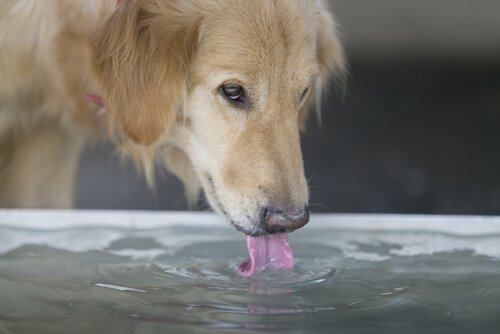How to Help Raise your Dog's Platelet Count


It’s important to have a healthy platelet count. Platelets play a fundamental role in forming blood clots and assisting with circulation through the body. A dog with a low platelet count can have serious health problems.
To avoid that, today we’ll discuss how to help a platelet-deficient dog reach a healthier count.
Why does platelet count fall?

When you notice than your dog is acting mopey, weak, or too tired to even spend time with you, it’s possible that its platelet count has dropped. Various factors contribute to this condition:
- Leukemia: This blood disease weakens platelets. As they disappear, the immune system is affected.
- Lymphoma: Any type of cancerous cell badly damages the blood, and therefore also the platelet count.
- Thrombocytopenia: With this disease, a dog’s body creates antibodies that fight against platelets and destroy them.
- Hemorrhages: When there is loss of blood, there is also loss of platelets.
- Tick-borne infections or ehrlichiosis: These also destroy your pet’s platelets.
Symptoms of a dog with a low platelet count
How can you tell if your dog has a low platelet count? If you observe its behavior, there are various signals that suggest something is not functioning correctly.
These are some of those signs:
- Apathy (not just during playtime, but also during meals)
- Fever
- Bruises on the skin (due to poor blood clotting)
- Blood in urine, in feces, or in the nose
- Problems getting up
How to raise a dog’s blood count
Once you’ve recognized the causes and symptoms, you can start thinking about how to help your pet. It’s important that a veterinarian diagnoses a low platelet count.
You should follow the vet’s treatment plan – normally they will suggest a transfusion, corticoids, iron, or another oral or intravenous medication.
There are also things that can be done at home to reinforce the vet’s treatment. These instructions should be followed to the letter.

- Since low platelet count can lead to fever, hydration is key.
- Though it may sound strange, chicken soup is one of the best foods for raising platelet count. Make one with a lot of vegetables and let it cook well. Later you could even chop the vegetables up further and enjoy them yourself. The broth and the vegetables will be ideal for raising your dog’s platelet count while also keeping it hydrated.
- As we mentioned before, the vet might prescribe your pet with iron, in which case feeding it iron-rich foods (like chicken livers) will help its recovery.
- Let your dog rest for a few days without exercising. This is not only to avoid fatigue, but also because there might be ticks outside that make the situation worse.
- Natural coconut water (not from a can or box) provides a lot of vitamins and minerals that encourage platelet replacement.
- Cooked, shredded chicken with no additives can help your pet recover.
These are only home remedies and should complement but never replace the vet’s orders. Remember that carefully observing your dog and being attentive to any changes is the key to recuperation.
Original article: https://misanimales.com/perro-plaquetas-bajas-ayudarlo-subirlas/

It’s important to have a healthy platelet count. Platelets play a fundamental role in forming blood clots and assisting with circulation through the body. A dog with a low platelet count can have serious health problems.
To avoid that, today we’ll discuss how to help a platelet-deficient dog reach a healthier count.
Why does platelet count fall?

When you notice than your dog is acting mopey, weak, or too tired to even spend time with you, it’s possible that its platelet count has dropped. Various factors contribute to this condition:
- Leukemia: This blood disease weakens platelets. As they disappear, the immune system is affected.
- Lymphoma: Any type of cancerous cell badly damages the blood, and therefore also the platelet count.
- Thrombocytopenia: With this disease, a dog’s body creates antibodies that fight against platelets and destroy them.
- Hemorrhages: When there is loss of blood, there is also loss of platelets.
- Tick-borne infections or ehrlichiosis: These also destroy your pet’s platelets.
Symptoms of a dog with a low platelet count
How can you tell if your dog has a low platelet count? If you observe its behavior, there are various signals that suggest something is not functioning correctly.
These are some of those signs:
- Apathy (not just during playtime, but also during meals)
- Fever
- Bruises on the skin (due to poor blood clotting)
- Blood in urine, in feces, or in the nose
- Problems getting up
How to raise a dog’s blood count
Once you’ve recognized the causes and symptoms, you can start thinking about how to help your pet. It’s important that a veterinarian diagnoses a low platelet count.
You should follow the vet’s treatment plan – normally they will suggest a transfusion, corticoids, iron, or another oral or intravenous medication.
There are also things that can be done at home to reinforce the vet’s treatment. These instructions should be followed to the letter.

- Since low platelet count can lead to fever, hydration is key.
- Though it may sound strange, chicken soup is one of the best foods for raising platelet count. Make one with a lot of vegetables and let it cook well. Later you could even chop the vegetables up further and enjoy them yourself. The broth and the vegetables will be ideal for raising your dog’s platelet count while also keeping it hydrated.
- As we mentioned before, the vet might prescribe your pet with iron, in which case feeding it iron-rich foods (like chicken livers) will help its recovery.
- Let your dog rest for a few days without exercising. This is not only to avoid fatigue, but also because there might be ticks outside that make the situation worse.
- Natural coconut water (not from a can or box) provides a lot of vitamins and minerals that encourage platelet replacement.
- Cooked, shredded chicken with no additives can help your pet recover.
These are only home remedies and should complement but never replace the vet’s orders. Remember that carefully observing your dog and being attentive to any changes is the key to recuperation.
Original article: https://misanimales.com/perro-plaquetas-bajas-ayudarlo-subirlas/
All cited sources were thoroughly reviewed by our team to ensure their quality, reliability, currency, and validity. The bibliography of this article was considered reliable and of academic or scientific accuracy.
- Ohta, K., Inokuchi, T., Hayashida, Y., Mizukami, T., Yoshida, T., & Kawahara, T. (2002). Regional diminution of von Willebrand factor expression on the endothelial covering arachnoid granulations of human, monkey and dog brain. The Kurume Medical Journal, 49(4), 177-183.
- Villaverde Pelaez, C. (2017). Evidencia serológica de Ehrlichia spp. en canes con cuadros de trombocitopenia en Iquitos.
- Kohn, B., Engelbrecht, R., Leibold, W., & Giger, U. (2000). Clinical findings, diagnostics and treatment results in primary and secondary immune-mediated thrombocytopenia in the dog. Kleintierpraxis, 45(12), 893-907.
- Gould, S. M., & McInnes, E. L. (1999). Immune‐mediated thrombocytopenia associated with Angiostrongylus vasorum infection in a dog. Journal of Small Animal Practice, 40(5), 227-232.
- Ridgway, J., Jergens, A. E., & Niyo, Y. (2001). Possible causal association of idiopathic inflammatory bowel disease with thrombocytopenia in the dog. Journal of the American Animal Hospital Association, 37(1), 65-74.
This text is provided for informational purposes only and does not replace consultation with a professional. If in doubt, consult your specialist.








